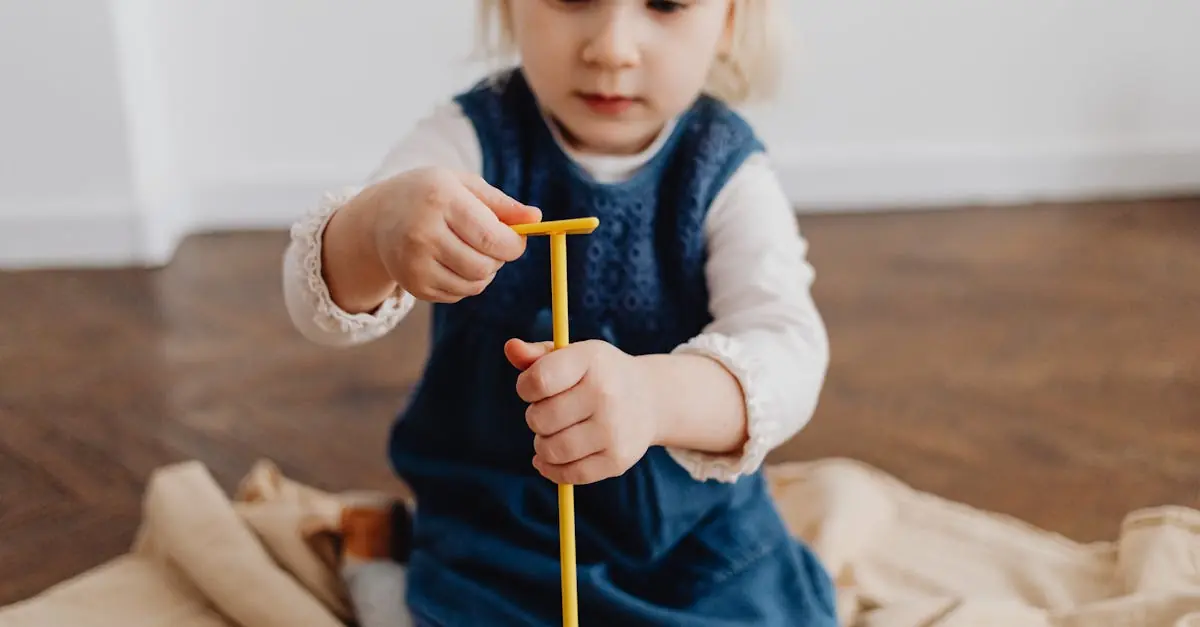Navigating the toddler years can feel like a wild rollercoaster ride—thrilling, unpredictable, and occasionally nauseating. From tantrums that could rival a Broadway performance to the sudden urge to turn every meal into a finger-painting session, parenting toddlers is no small feat. But fear not, because with the right tips and tricks, every parent can transform chaos into a charming adventure.
Table of Contents
ToggleUnderstanding Toddler Development
Understanding toddler development helps parents anticipate growth and challenges. Recognizing the stages assists in fostering a positive environment.
Physical Milestones
Physical milestones mark crucial developments in a toddler’s life. By age two, many toddlers can walk, run, jump, and climb. Fine motor skills also progress, enabling them to stack blocks, scribble, and manipulate small objects. Gross motor skills require practice; toddlers often enjoy activities like throwing balls or riding tricycles. Regular physical activity encourages these skills while promoting overall health.
Emotional Growth
Emotional growth significantly influences toddlers’ interactions. During this stage, toddlers begin expressing a range of feelings, including joy, frustration, and fear. As they navigate emotions, they require guidance to manage feelings and develop empathy. Attachment to caregivers forms a sense of security, fostering emotional resilience. Teaching emotion recognition aids in developing social skills that benefit relationships. Recognizing these emotional changes helps parents provide appropriate support during this critical stage.
Effective Communication Strategies
Effective communication forms the backbone of parenting toddlers. Implementing the right strategies fosters understanding and reduces frustration for both parent and child.
Using Simple Language
Using simple language helps toddlers grasp concepts easily. Short sentences paired with familiar words facilitate comprehension. Phrases like “time to eat” or “let’s go outside” communicate messages clearly. Repeating important phrases reinforces understanding. Consistent language for routines builds familiarity. Encouraging vocabulary through books or songs enhances language skills. Engaging in dialogue supports language development and makes conversations enjoyable.
Encouraging Expression
Encouraging expression aids emotional development in toddlers. Asking open-ended questions invites toddlers to share their thoughts. Questions like “How did that make you feel?” promote emotional awareness. Giving them options fosters independence, allowing them to choose between snacks or activities. Encouraging storytelling enhances creativity and vocabulary. Using art or play as outlets for feelings cultivates expression and provides insights into their emotions. Listening attentively validates their feelings and strengthens the parent-child bond.
Establishing Routines
Establishing routines provides structure in the daily lives of toddlers and parents. These routines create a sense of security for young children.
Importance of Consistency
Consistency plays a vital role in helping toddlers understand what to expect throughout the day. Familiar routines allow toddlers to develop trust in their environment. Regularly scheduled activities support their emotional security. Parents who maintain predictable patterns notice increased cooperation and reduced anxiety in their children. Behavioral expectations, when consistently reinforced, encourage self-discipline and independence. By offering stable routines, parents foster a nurturing atmosphere that aids their toddlers’ emotional and cognitive development.
Creating a Daily Schedule
Creating a daily schedule ensures balance between activities and rest. Parents can outline key events such as meals, playtime, and bedtime, incorporating flexibility for spontaneous moments. Visual aids, like charts or pictures, enhance understanding for toddlers, allowing them to anticipate upcoming tasks. Even incorporating favorite stories or songs during transitions keeps engagement high. Assigning specific times for routine tasks helps toddlers learn time awareness. Overall, a well-defined schedule, while adaptable, supports smooth transitions and promotes a peaceful home environment.
Positive Discipline Techniques
Positive discipline techniques focus on guiding toddlers toward appropriate behavior while fostering a nurturing environment. These approaches help parents navigate the complexities of toddler behavior with confidence.
Setting Boundaries
Establishing clear boundaries provides toddlers with a sense of security. Parents should communicate expectations explicitly and consistently. When toddlers understand limits, they’re less likely to test them. Using simple language helps toddlers grasp these boundaries more effectively. It’s essential to explain the reasons behind rules, as this builds understanding. Reassuring toddlers that boundaries exist to keep them safe encourages compliance. When they push against limits, a calm reminder reinforces the importance of staying within them. Offering choices within those boundaries empowers toddlers and promotes autonomy.
Reinforcing Good Behavior
Reinforcement plays a crucial role in encouraging desirable behaviors. Praising toddlers for positive actions fosters self-esteem and motivation. Parents can highlight specific behaviors to ensure toddlers understand what they did well. Celebrating small successes creates new habits and encourages repeat performances. Implementing a reward system helps toddlers associate good behavior with positive outcomes. Simple rewards, like stickers or extra playtime, can significantly impact their choices. Maintaining a positive outlook during interactions supports an atmosphere of trust. Focusing on what toddlers do right rather than constantly correcting misbehavior minimizes frustration for both parties.
Engaging Activities for Learning
Engaging activities enhance toddlers’ learning experiences. Parents can incorporate various methods that capture their child’s interest.
Play-Based Learning
Play-based learning promotes cognitive development. Toddlers learn through interaction with toys and peers, fostering creativity and problem-solving skills. Activities like building blocks enhance spatial awareness. Art projects allow toddlers to express emotions and ideas. Using themed play, such as a mini grocery store, teaches them about numbers and social skills. This approach creates a fun atmosphere where learning occurs naturally.
Outdoor Exploration
Outdoor exploration connects toddlers with nature and the environment. Activities like nature walks stimulate curiosity and observation skills. Collecting leaves or rocks promotes sensory experiences and vocabulary expansion. Parents can set up a scavenger hunt to encourage active participation and teamwork. Observing bugs or clouds supports scientific thinking. Encouraging outdoor play fosters physical wellness and emotional well-being while enhancing a child’s appreciation for the world around them.
Parenting toddlers is a unique journey filled with both challenges and rewards. By understanding developmental milestones and employing effective communication strategies, parents can create a nurturing environment that fosters growth. Establishing routines and practicing positive discipline further enhances a toddler’s sense of security and emotional well-being. Engaging in play-based learning and outdoor activities not only promotes cognitive development but also strengthens the parent-child bond. With patience and consistency, parents can navigate this exciting stage of life while nurturing their child’s curiosity and independence. Embracing these strategies will lead to a more harmonious and joyful parenting experience.



